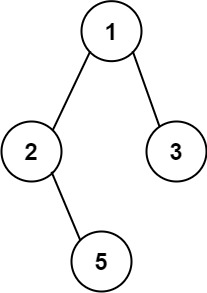257. Binary Tree Paths
Description
Given the root of a binary tree, return all root-to-leaf paths in any order .
A leaf is a node with no children.
Example 1:

1
2
| Input: root = [1,2,3,null,5]
Output: ["1->2->5","1->3"]
|
Example 2:
1
2
| Input: root = [1]
Output: ["1"]
|
Constraints:
- The number of nodes in the tree is in the range
[1, 100].
-100 <= Node.val <= 100
Hints/Notes
Solution
Language: C++
1
2
3
4
5
6
7
8
9
10
11
12
13
14
15
16
17
18
19
20
21
22
23
24
25
26
27
28
29
30
31
32
33
34
35
36
37
38
39
|
class Solution {
public:
vector<string> res;
vector<string> binaryTreePaths(TreeNode* root) {
traverse(root, "");
return res;
}
void traverse(TreeNode* root, string path) {
if (!root) {
return;
}
path += to_string(root->val);
bool node = true;
if (root->left) {
traverse(root->left, path + "->");
node = false;
}
if (root->right) {
traverse(root->right, path + "->");
node = false;
}
if (node) {
res.push_back(path);
}
}
};
|
